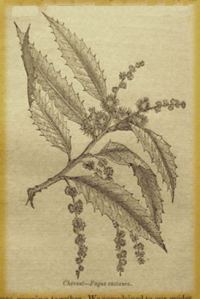
Properties of Timber: Chesnut
The Chesnut tree (Fagus castanea) is a native of Asia. It is very abundant in the mountains of South-East Europe; also in North America. The Castagno de cento cavalli, or chesnut of the hundred horses, on Mount Etna, is probably the largest tree in Europe, being two hundred feet in circumference.
In most parts of Britain the chesnut thrives well.
Chesnut is more durable than oak when used for posts. There is an account of this in the Transactions of the Society of Arts for 1789. Posts of chesnut and oak had been put down at Wellington, Somerset, before 1745. About 1763, when they had to undergo repair, the oak posts could not be re-used but the chesnut were little worn. The oak posts were replaced by new, and the chesnut allowed to remain. In 1788 the chesnut posts which had stood twice as long as the oak were found in better condition.
Young Chesnut is superior to young oak for woodwork which has to be partly in the ground.
We have not heard how it compares against larch for this application.
Large chesnut trees were more abundant in England than they are now. The timber was used indiscriminately with oak, in the construction of houses, in mill-work, and in household furniture. It is quick growing.
The roof of Westminster Hall is formed of chesnut. It is the largest roof of the ancient construction anywhere to be found, and it is difficult to imagine a work of human art which possesses, in so equal a degree, the three requisites of beauty, strength and durability. This hall was built by William II (Rufus) in the year 1097. It was originally intended as a banqueting hall, and the king held a magnificent feast in it on the Whitsuntide after its erection. It is two hundred and seventy-five feet long and seventy-four feet wide.
The present roof was constructed in the time of Richard II, who, in the profusion of that expenditure which led to Wat Tyler's insurrection, is reported to have feasted ten thousand guests under it. Westminster Hall is now set apart for the most solemn state purposes, such as the trial of persons impeached by the Commons, and banquets at the coronation of kings.
Wood-cut:

summarised from "The Library of Entertaining Knowledge - Timber trees" (1829), pub. Charles Knight, Pall Mall.
ND, habitat21
big turbines
small turbines